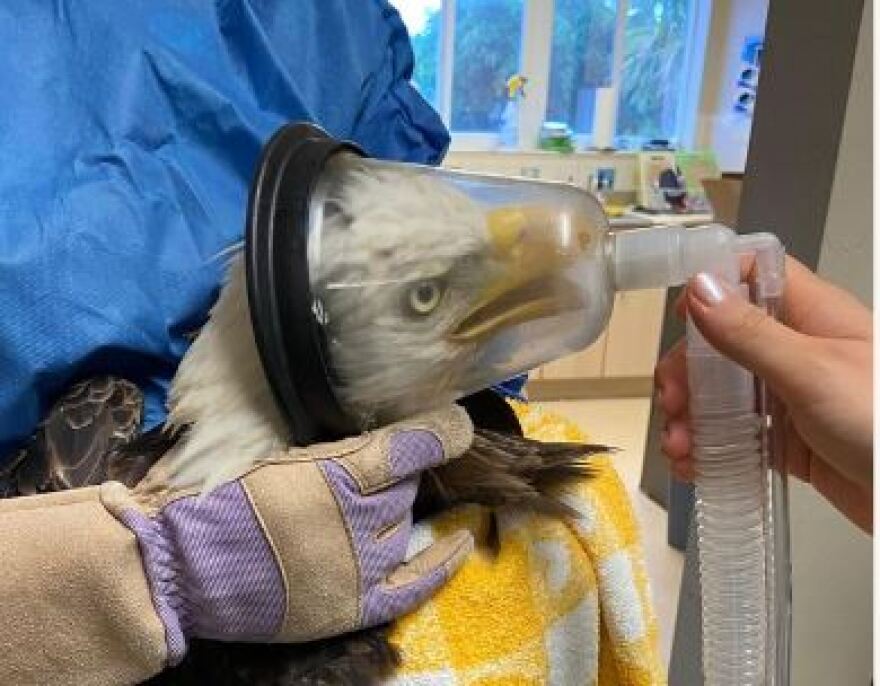An adult bald eagle being treated at The Clinic for the Rehabilitation of Wildlife after being admitted with severe injuries on Sunday has been euthanized.
"The people that monitor that nest have sighted both birds since this other one came into the clinic. So it's by process of elimination, not one of the eagle cam eagles," said CROW’s staff veterinarian, Dr. Robin Bast.
Virginia Pritchett McSpadden, co-founder of the Southwest Florida Eagle Cam web site that has faithfully kept an electronic eye on the nest for more than a dozen years, was saddened that any eagle had to be euthanized.
"Sad day, nonetheless, for the raptor species," she said.
Administrators and others on several other social media sites devoted to the Bayshore Road site of the Southwest Florida Eagle Cam nest confirmed that the nest's main male eagle, named M15, was not the raptor euthanized.
It isn't known how or when the raptor was hit, nor by what type of vehicle.
Ali Reece, CROW's public relations and marketing manager, said bald eagles commonly feed on carcasses on roadways that have been hit by cars.
"We do not have any reports of carcasses on the road near where the eagle was found," she said. " So we can’t say for sure, but it is a possibility."
Dr. Bast said the roadkill aspect was a common scenario for raptors.
“Believe it or not, eagles, as well as vultures, are pretty commonly hit by a car because they're opportunistic scavengers," she said. "So, if they see roadkill, in the middle of the road, then they're more likely to go after that, because it's easy food.”
Dr. Bast said that anyone who has seen or finds an injured animal should contact CROW.
The CROW hospital can be reached at 239-472-3644, ext. 222, seven days a week from 8 a.m. to 5 p.m.
"(If they) go to our website we have a list of resources for rescuing different animals and a list of drop off sites throughout the county," she said. "So if it's after hours and we're closed they can look at those resources as well."
The U.S. Fish and Wildlife Service has instructed the eagle’s remains be sent to the National Eagle Repository as part of the Native American eagle feather program.
The eagle was rescued from the intersection of Cleveland Avenue and Pondella Road after being found dragging itself onto the median using its wings.
Lee County Domestic Animal Control Services safely contained the eagle and brought it to BluePearl Pet Hospital, one of CROW’s animal drop off locations, where it was then transported by a CROW volunteer to their hospital on Sanibel for evaluation.
Upon admission, a physical exam confirmed extensive traumatic injuries consistent with suspected vehicle collision.
“A neurologic exam revealed the eagle was unable to move or feel its legs. It had bruising and swelling near the base of its spine, and secondary injuries including wounds on its wings and feet consistent with dragging itself across the road” Dr. Bast said. The bird was anesthetized for x-rays which confirmed spinal damage.
“We took radiographs, and those images confirmed severe damage at the base of the spine near the pelvis. Unfortunately, this has caused irreversible paralysis for this eagle,” she said.
Given the severity of the damage to the spinal cord and permanent paralysis, it was not a candidate for placement as a captive bird in an educational zoological facility. “Given the extent of damage to the spinal cord, euthanasia was the only humane treatment option for this eagle” she said.
“This case was reported to U.S. Fish and Wildlife Service in accordance with federal regulations.”
The eagle admitted was unbanded and suspected to be a male based on its body size and x-ray images.
About Clinic for the Rehabilitation of Wildlife (CROW)
Established in 1968, the Clinic for the Rehabilitation of Wildlife (CROW) is a teaching hospital saving the sick, injured and orphaned native and migratory wildlife of Southwest Florida and beyond. Through state-of-the-art veterinary care, public education programs and an engaging visitor center, CROW works to improve the health of the environment, humans and our animals through wildlife medicine. For more information, or to plan your visit, go to www.crowclinic.org. If you find an animal that is in need of help, call (239) 472-3644 ext. #222.
WGCU is your trusted source for news and information in Southwest Florida. We are a nonprofit public service, and your support is more critical than ever. Keep public media strong and donate now. Thank you.








